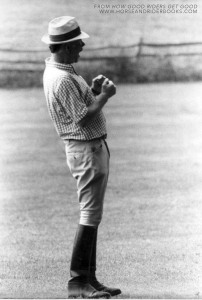In his bestselling book HOW GOOD RIDERS GET GOOD, famed rider, trainer, and coach Denny Emerson details seven areas of choice each of us face during our evolution as equestrians, and how our decisions in those areas transform us from “wannabes” to “gonnabes”…or don’t. He also shares experiences drawn from his lifetime working with horses—competing, learning, and teaching—including this demonstration of one renowned coach’s genius:

Sometimes there are coaches so gifted at manipulating the hearts and minds of their players that they transcend ordinary coaching to become legendary figures in their chosen sports.
In my lifetime there have been three of these coaches connected with the United States Equestrian Team: Bertalan de Nemethy and George Morris, both coaches of the USET Show Jumping Team, and Jack Le Goff, who arrived in the United States from his native France in 1970, hired to revive the flagging fortunes of US Eventing.
In July 1974, the US Eventing Squad chosen to compete at the Burghley World Championship Three-Day Event in September flew from New York to London to spend a couple of months leading up to the big event training at a facility in the south of England.
We were, as Stalin said to the Russian troops as they finally invaded German soil, “in the belly of the beast.” Through the late 1960s and well into the 1970s, the English Three-Day Team had crushed all opposition. As we began our tentative challenge to that English might, we were painfully aware that our English hosts were the reigning gold medalists from both the 1970 World Championships and the 1972 Olympic Games.
One quiet summer evening a wave of excitement swept the American camp. Richard Meade, the captain of the English team and the current Olympic goal medalist, was coming to try a horse that someone had brought in as a sales prospect.
All six of us trooped down to the show-jumping arena to watch Richard school this horse, and we were perched on the top rail like six birds on a wire. I looked down the country lane that passed by the schooling area, and who should be strolling toward us but our coach, Jack Le Goff, complete with fishing rod, reel, and high-topped waders.
I was sitting next to our team captain Mike Plumb, and I said something to him like, “Won’t Jack be interested to watch this?”
Mike replied, “He won’t even stop.”
Sure enough, Jack walked right on by, smiled, called out, “Hello, everybody. Hello, Richard,” but didn’t even pause.
Mike knew Jack better than I did, and he also understood Jack’s psychological insight into his riders. Later, I also understood what Jack had done, but I didn’t at the time.
Jack wasn’t going to validate Richard Meade in our minds by paying him the slightest attention. To acknowledge that this gold-medal winner had anything to show that was worth Jack’s time would not have been the way to persuade us that we had what it took to beat the world’s predominant three-day-event team.
Thirty-four years later I told this story to George Morris, another Olympic gold medal coach. “Jack is a genius,” said George, “and you know I don’t say that about many people.”

Emerson’s book HOW GOOD RIDERS GET GOOD is available from the TSB online bookstore, where shipping in the US is FREE.
CLICK HERE for more information.
(And watch for his new book, coming Fall 2018!)
TSB also publishes George Morris’s autobiography UNRELENTING and Jack Le Goff’s HORSES CAME FIRST, SECOND, AND LAST. You can buy them at a special package discount HERE.
Trafalgar Square Books, the leading publisher of equestrian books and DVDs, is a small business based on a farm in rural Vermont.

